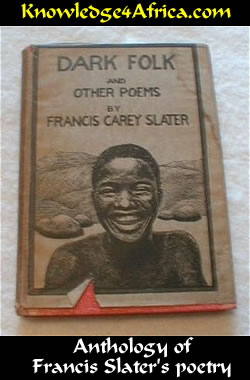|
READ THIS
Wetu the black cow is dead. The people are saddened as they remember her and how she had enriched
their lives. We also learn of a possible reason for her death.
 ABOUT THE POET
ABOUT THE POET
Francis Carey Slater was born near Alice in 1876, the grandson of an 1820 settler.
He received some of his schooling at Lovedale College, a seminary about 13 kilometres from Alice that
had been created as early as 1841 to educate black children but which did at times enrol the occasional
white child.
Carey's formative years in the Alice area were at a time of great hardship for the rural community. The
young poet was therefore deeply immersed in the tragedy of disease and drought -- the theme of this
poem.
Upon leaving the college, he took up work with the Standard Bank -- a pre-eminent institution in the
Eastern Cape -- where he rose eventually to the position of manager at the Graham's Town branch.
Upon taking early retirement, he moved to Cape Town but maintained his link with the Eastern Cape as
his source of inspiration while he continued to perfect his poetic skills.
Slater is regarded as the first English-speaking South African to write real poetry rather than simple verse.
He grew up with the African people, and wrote of them "as he knew them, with familiarity and
conviction".
His poetry has been described as having "real inventiveness" and "a sensual awareness of his
subjects that lead to the coining of fresh images". It is said that he often evoked "a uniquely South
African experience by image and rhythm".
He died in 1958 at the age of 82.
Have you looked at the questions
in the right column?
|
TEST YOURSELF!
Read the left column and then answer
the following questions:
"Beautiful was Wetu as a blue shadow
That nests on the grey rocks
About a sunbaked hilltop:
Her coat was black and shiny
Like an isipingo-berry."
- Is there any reason for the poet's choosing the words "Beautiful was Wetu" rather than
"Wetu was beautiful"? (2)

[Need help?]
There are possibly two reasons for doing this.
First, it couches the words in a much more poetic framework, whereas "Wetu was beautiful" is
merely a statement of fact without feeling.
Second, is this not perhaps a literal translation of the Xhosa? If so, then the poet is attempting a literal
translation of the words, thereby capturing the feeling of the people who are lamenting.
|
- There are two similes in the above extract. What is the subject of each one? (2)

[Need help?]
The beauty of the cow, Wetu, is the subject of the simile "as a blue shadow". On the other hand,
it is her coat which is the colour of the isipingo-berry.
|
- What does the simile "as a blue shadow | That nests on the grey rocks | About a sunbaked
hilltop" tell us: something about the cow itself? or something about the beauty of the
cow? (2)

[Need help?]
This simile is very definitely telling us something of the beauty of the cow.
|
"Her round eyes were as clear and soft
As a mountain-pool,
Where shadows dive from the high rocks."
- What features of a mountain pool would the poet be seeing as a fitting comparison to the cow's
eyes? (5)

[Need help?]
Both the pool and the cow's eyes are round. Second, both the eyes and the water are shiny, comforting
and gentle. Third, both her eyes and the water reflect the world round about them.
|
- What is meant by personification? (2)

[Need help?]
Personification is the bestowing of human characteristics on an object or an animal.
|
- In what way could the shadows "dive from the high rocks"? (4)

[Need help?]
Only a human dives. This is therefore an example of personification.
In this case, the shadows don't actually dive into the pool from the high rocks above. They are merely
reflected in the pool.
Nevertheless, the shadows appear simultaneously in the rocks above as well as in the pool below. It is
immediate. The word "dive" denotes this instantaneous appearance: it is as if the shadows dive
into the pool, landing there almost immediately.
|
"No more will Wetu banish teasing flies
With her whistling tail."
- What part of speech are the words "teasing" and "whistling"? (2)

[Need help?]
Both "teasing" and "whistling" are present participles that are being used as adjectives.
|
- Why would the poet have chosen the word "teasing" to describe the flies rather than, say,
"irritating" or "annoying"? (4)

[Need help?]
The word "teasing" does not carry the same tone of annoyance as does "irritating" or
"annoying".
When flies buzz around a cow, do they truly annoy? The cow usually ignores them, apart from the swish
of her tail. The word "teasing" probably carries just the right tone for what the flies are doing.
The word "teasing" also carries a much more lyrical or poetic quality to it.
|
|



